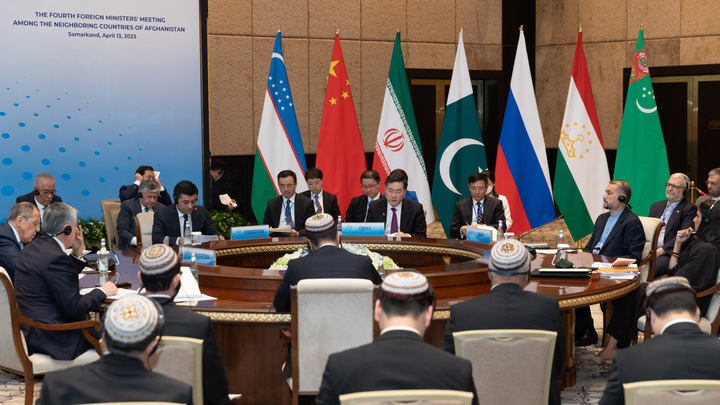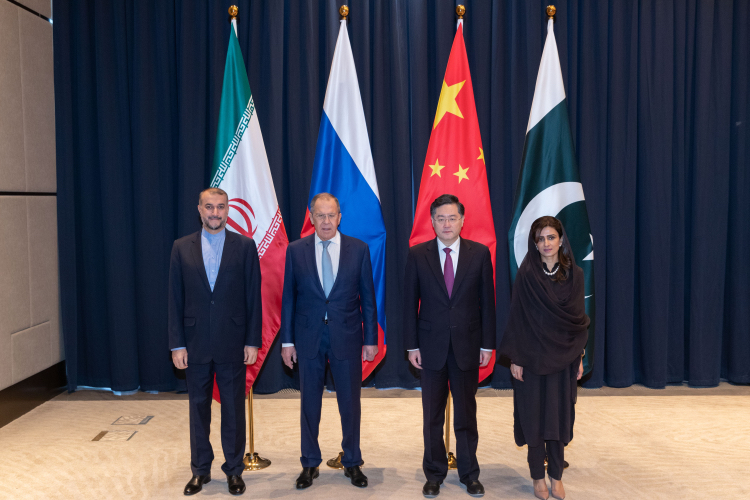
Chinese State Councilor and Foreign Minister Qin Gang attends the fourth Foreign Ministers' Meeting among the Neighboring Countries of Afghanistan in Samarkand, Uzbekistan, April 13, 2023. /Xinhua
Chinese State Councilor and Foreign Minister Qin Gang attends the fourth Foreign Ministers' Meeting among the Neighboring Countries of Afghanistan in Samarkand, Uzbekistan, April 13, 2023. /Xinhua
Editor's note: Bobby Naderi is a London-based journalist, guest contributor in print, radio and television, and documentary filmmaker. The article reflects the author's opinions, and not necessarily the views of CGTN.
Afghanistan is currently going through a difficult time of adjustment and transition in its domestic and foreign policies, which is marked by worries about terrorism and instability. In light of this, Chinese State Councilor and Foreign Minister Qin Gang has put forth a four-point plan to deal with Afghanistan's issues and promote security and stability in the region.
The four-point proposal was put forth at the fourth Foreign Ministers' Meeting among the Neighboring Countries of Afghanistan in Samarkand, Uzbekistan. Senior diplomats from China, Turkmenistan, Russia, Iran, Tajikistan, and Pakistan approved the initiative in their Samarkand Declaration, which was presided over by the acting Uzbek Foreign Minister, Bakhtiyor Saidov.
Good neighborliness and friendly cooperation
The Chinese plan's first recommendation is to take tough action against the terrorist groups operating in Afghanistan and keep the country from serving as a sanctuary for international terrorism. Afghanistan's neighbors are expected to work together to improve its counterterrorism capabilities to successfully stop cross-border terrorist operations and subsequent destabilization. The ultimate goal is to turn the country into a platform for anti-terrorism cooperation among neighbors rather than geopolitical games.
The second demand is for the U.S. to carry out its international obligations, end its one-sided sanctions against Afghanistan, and return its foreign assets. After the U.S.'s disastrous withdrawal, there should be no confusion. The decision to leave that nation in such circumstances served as a warning that Washington has no intention to help rebuild Afghanistan. The U.S. could have at least lift its sanctions, return the overseas assets, and deliver its pledged humanitarian aid to meet the basic needs of ordinary people in Afghanistan.
The third point is to influence the Afghan Taliban to adopt modern practices, gain knowledge from more experienced Muslim nations, and demonstrate greater inclusivity and progress in the enactment and particular governance of political authority. To achieve this, inclusive governance that respects Afghanistan's independence, sovereignty and sense of self-worth must be built and supported in the region.

Chinese State Councilor and Foreign Minister Qin Gang (2nd, R), Russian Foreign Minister Sergei Lavrov (2nd, L), Iranian Foreign Minister Hossein Amir-Abdollahian (1st L) and Pakistan's Minister of State for Foreign Affairs Hina Rabbani Khar pose for a group photo before the second informal meeting of foreign ministers of China, Russia, Pakistan and Iran on the Afghan issue in Samarkand, Uzbekistan, on April 13, 2023. /Xinhua
Chinese State Councilor and Foreign Minister Qin Gang (2nd, R), Russian Foreign Minister Sergei Lavrov (2nd, L), Iranian Foreign Minister Hossein Amir-Abdollahian (1st L) and Pakistan's Minister of State for Foreign Affairs Hina Rabbani Khar pose for a group photo before the second informal meeting of foreign ministers of China, Russia, Pakistan and Iran on the Afghan issue in Samarkand, Uzbekistan, on April 13, 2023. /Xinhua
The fourth recommendation is to carry out actual collaboration in Afghanistan, and China has committed to helping with reconstruction efforts to the best of its ability. China's proficiency in infrastructure development is one of its key advantages. The country has a long history of doing significant infrastructure projects, such as building roads, rail networks and large-scale infrastructure projects under the Belt and Road Initiative. This experience might be extremely helpful in restoring Afghanistan's infrastructure, which has been severely damaged by war.
Opportunities and adversities
Given that China has already built the Karakoram Highway, which connects the two nations via Pakistan, Afghanistan could experience tremendous infrastructure development opportunities. China is well-positioned to provide funding for a comparable project in Afghanistan. The Chinese government formed the Asian Infrastructure Investment Bank, which has been sponsoring infrastructure projects all over Asia and may be able to provide funding for Afghanistan's economic reintegration.
It is hopeful that the participants of the Fourth Meeting of Foreign Ministers of Afghanistan's Neighboring States concurred that all this and more is applicable. They agreed to help Afghanistan integrate into the region's economy and increase its potential for independent and sustainable development.
Nonetheless, the Samarkand Declaration and the Chinese proposal draw attention to the difficulties that must be overcome as well. Violence has increased recently, especially in rural regions, and due to the absence of economic opportunities and alternative development.
Additionally, the economic situation has gotten worse due to the global downturn and the U.S. sanctions. All too ominously, the refugee situation is yet another significant issue. Millions of Afghan refugees have been living in Iran and Pakistan. The current situation will probably result in more migration and displacement, which will have a substantial impact on the region's security and stability.
By now, it should be clear that the Chinese plan to deliver prosperity and peace to Afghanistan can be carried out firmly and decisively. The four-point proposal provides a direction for improving regional peace and stability.
To take Afghanistan out of the era of "forever war" and the horrible mess that it is currently in, all parties, including the neighboring countries and the international community, are expected to fully cooperate and support China's sincere plan in both words and action. Stabilizing the war-torn country and removing the cause of instability, albeit being a lengthy and difficult process, is essential for the security and prosperity of all nations in the region.
(If you want to contribute and have specific expertise, please contact us at opinions@cgtn.com. Follow @thouse_opinions on Twitter to discover the latest commentaries in the CGTN Opinion Section.)